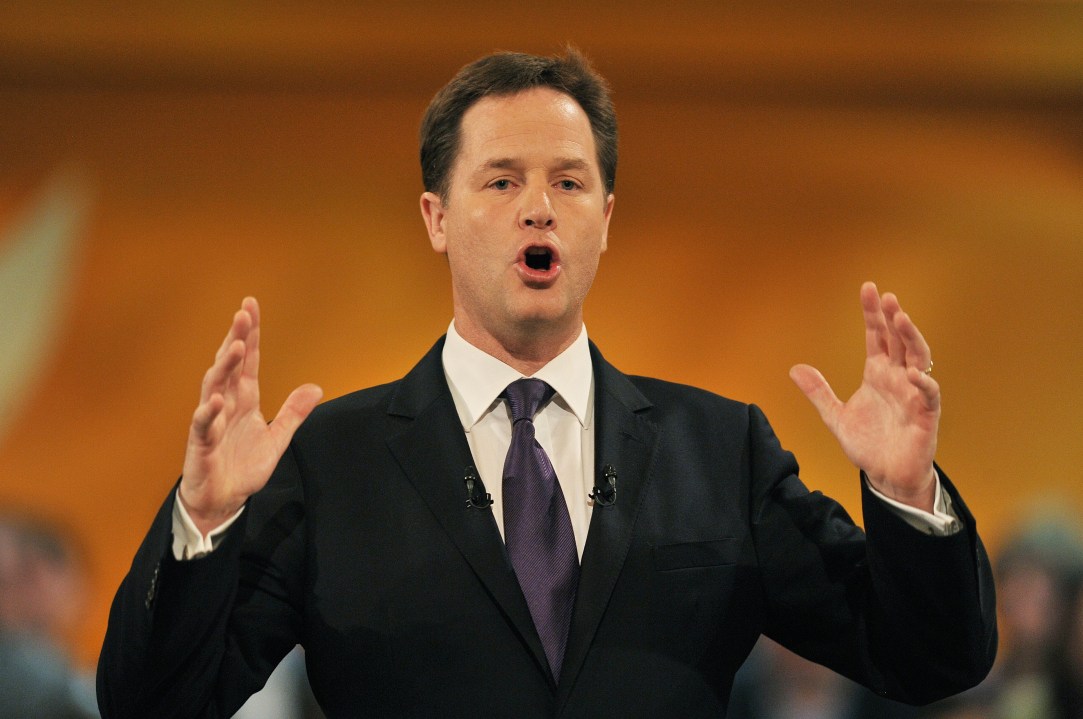 “The Deputy Prime Minister, Nick Clegg, will today announce proceeds from the
government growth fund which will protect or safeguard 200,000 jobs.” This sentence contains everything that’s wrong about this government’s schizophrenic approach to economic
recovery. Rather than cut taxes and let the economy grow, they increase tax — and then give people back a portion of the cash, expecting to be thanked as they do so. And, for good measure,
dropping in a spurious jobs number.
“The Deputy Prime Minister, Nick Clegg, will today announce proceeds from the
government growth fund which will protect or safeguard 200,000 jobs.” This sentence contains everything that’s wrong about this government’s schizophrenic approach to economic
recovery. Rather than cut taxes and let the economy grow, they increase tax — and then give people back a portion of the cash, expecting to be thanked as they do so. And, for good measure,
dropping in a spurious jobs number.
Nick Clegg was on the Today programme this morning, showcasing the phenomenon that retards so many economies: politicians seeking credit for giving one man’s money to another. He started off by announcing that he, Nick Clegg, had “created and overseen” the fund as if he was a Carnegie figure, doling out his millions to a grateful nation. Except to assemble this cash, he had to tax someone — now or (through debt) in the future. You can bet the Treasury doesn’t have figures for how many jobs are forfeited by extra spending, or debt (as far as I’m aware, only The Spectator has ever commissioned such an analysis — here).
The tragedy is that his analysis of the problem was correct. Under Labour, he said, “in large parts of the country, which for far too long were over-reliant on handouts from Whitehall, so job-creation was down to decision-makers in Whitehall rather than to communities themselves.” So, to remedy this, he’s giving out, erm, a big handout from Whitehall. He’s deciding which projects to allocate money to.
No wonder that so much confusion surrounds the government’s growth strategy. The government is sending out conflicting messages all the time. Osborne talks about tax cuts, while delivering tax increases. It says “there is no money left” while doubling the international aid budget. Clegg talks about the problem of the Man in Whitehall trying to direct regional economies, before going on to direct regional economies. In Vince Cable we have a Business Secretary who seems to regard his job as complaining about businesses. He is perhaps the only business secretary who disparages capitalism as a system which “takes no prisoners”.
No government can ‘create’ jobs. The best it can do is move jobs, from the private to the public sector. Or, via debt, from the future into the present. Its massive schemes are conducted with hardly any proper cost-benefit analysis. The UK government will soon be spending more on debt interest than education, defending the realm, transport, etc. How much will that retard future growth? How will it stymie Britain’s potential for recovery? You won’t find any government analysis into the longer-term employment effects of borrowing money. Far better to announce cash now, and make out that the money arrived down on a moonbeam. If you ask too many questions, you end up with answers like the Tullet Preborn report (pdf).
The most sensible, workable policy for growth I’ve seen is Adrian Beecroft report, leaked to the Telegraph last week, on deregulating British business. Luke Johnson, a writer who actually runs companies and creates jobs, wrote a persuasive piece about this in the FT on Saturday. The Beecroft proposals should be the acid test about whether this coalition government is serious about growth, and capable of producing policies to help it. Many (myself included) argue that we need to repatriate control over labour markets (or, in Clegg’s parlance, a “unilateral raid on Brussels’ powers”) to deregulate and create more jobs. And yet, it’s by no means sure that this eminently sensible policy will make it through the coalition.
I leave CoffeeHousers with a thought: if the government can’t even deregulate where we do have power to do so, what makes us think it would do so much better if it manages to get powers back from
Brussels? The real obstacles, I fear, may be far closer to home.
P.S. It was Clegg today, but could have been anyone announcing that X million of borrowed cash will create Y new jobs. This is the same delusion that is currently sinking the
Eurozone. Someone has to earn the money. Until that problem is confronted, we’ll get nowhere.








Comments